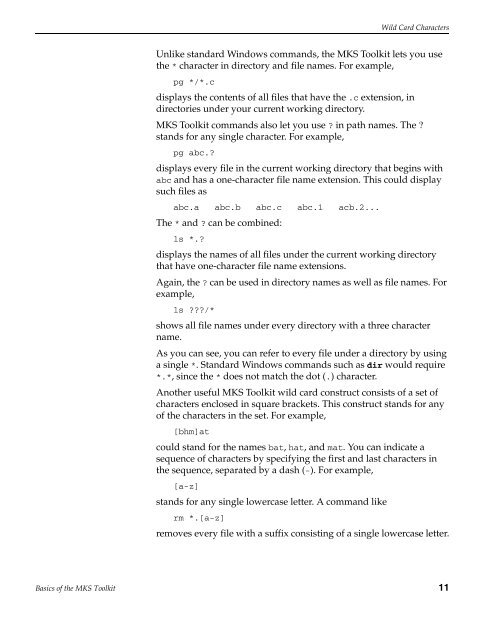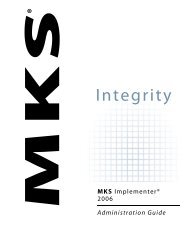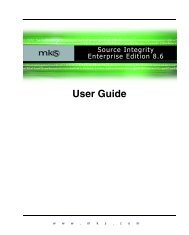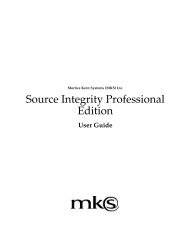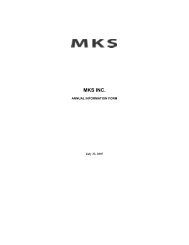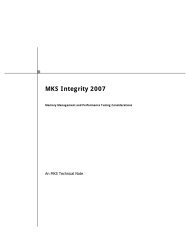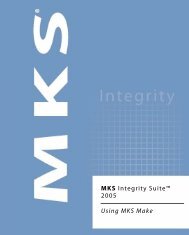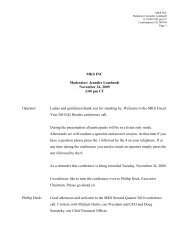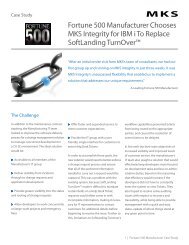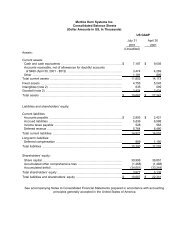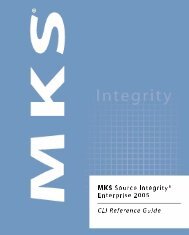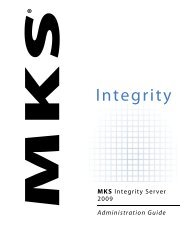Basics of the MKS Toolkit - Mks.com
Basics of the MKS Toolkit - Mks.com
Basics of the MKS Toolkit - Mks.com
Create successful ePaper yourself
Turn your PDF publications into a flip-book with our unique Google optimized e-Paper software.
Wild Card Characters<br />
Unlike standard Windows <strong>com</strong>mands, <strong>the</strong> <strong>MKS</strong> <strong>Toolkit</strong> lets you use<br />
<strong>the</strong> * character in directory and file names. For example,<br />
pg */*.c<br />
displays <strong>the</strong> contents <strong>of</strong> all files that have <strong>the</strong> .c extension, in<br />
directories under your current working directory.<br />
<strong>MKS</strong> <strong>Toolkit</strong> <strong>com</strong>mands also let you use ? in path names. The ?<br />
stands for any single character. For example,<br />
pg abc.?<br />
displays every file in <strong>the</strong> current working directory that begins with<br />
abc and has a one-character file name extension. This could display<br />
such files as<br />
abc.a abc.b abc.c abc.1 acb.2...<br />
The * and ? can be <strong>com</strong>bined:<br />
ls *.?<br />
displays <strong>the</strong> names <strong>of</strong> all files under <strong>the</strong> current working directory<br />
that have one-character file name extensions.<br />
Again, <strong>the</strong> ? can be used in directory names as well as file names. For<br />
example,<br />
ls ???/*<br />
shows all file names under every directory with a three character<br />
name.<br />
As you can see, you can refer to every file under a directory by using<br />
a single *. Standard Windows <strong>com</strong>mands such as dir would require<br />
*.*, since <strong>the</strong> * does not match <strong>the</strong> dot (.) character.<br />
Ano<strong>the</strong>r useful <strong>MKS</strong> <strong>Toolkit</strong> wild card construct consists <strong>of</strong> a set <strong>of</strong><br />
characters enclosed in square brackets. This construct stands for any<br />
<strong>of</strong> <strong>the</strong> characters in <strong>the</strong> set. For example,<br />
[bhm]at<br />
could stand for <strong>the</strong> names bat, hat, and mat. You can indicate a<br />
sequence <strong>of</strong> characters by specifying <strong>the</strong> first and last characters in<br />
<strong>the</strong> sequence, separated by a dash (-). For example,<br />
[a-z]<br />
stands for any single lowercase letter. A <strong>com</strong>mand like<br />
rm *.[a-z]<br />
removes every file with a suffix consisting <strong>of</strong> a single lowercase letter.<br />
<strong>Basics</strong> <strong>of</strong> <strong>the</strong> <strong>MKS</strong> <strong>Toolkit</strong> 11


